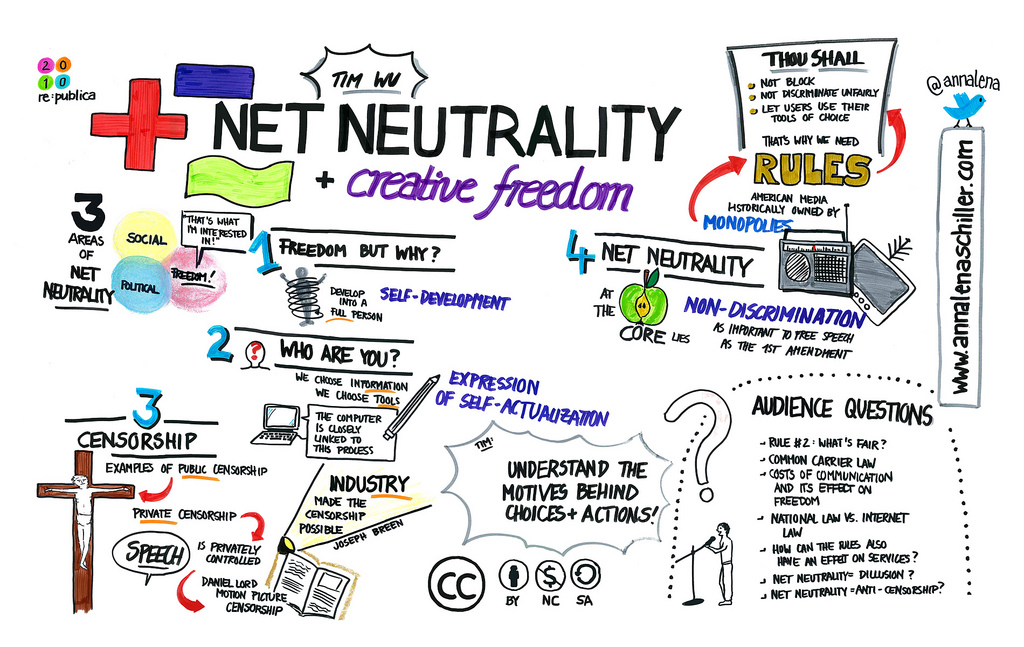Today's CRTC network management hearing featured some stunning discussion on the throttling of wholesale services that undoubtedly left many observers wondering whether the Commission actually understood what it was doing in the CAIP throttling complaint against Bell (CAIP has asked the Commission to reconsider the decision). The discussion started when […]

Net Neutrality And Creative Freedom (Tim Wu at re:publica 2010) by Anna Lena Schiller (CC BY-NC-ND 2.0) https://flic.kr/p/7VfazT
Net Neutrality
ACTRA Speaks Out For Net Neutrality
ACTRA appeared before the CRTC today on net neutrality and has issued a press release urging the Commission to enshrine a principle of net neutrality.
CRTC Network Management Hearings, Day Two: Open Internet Coalition, Zip.ca, CISP, Roks, Mezei
Day two of the CRTC network management hearing featured some great presentations from the Open Internet Coalition, Zip.ca, CISP, and two knowledgeable individuals – Jean-Francois Mezei and Jason Roks. The presenters had some strong words about the lack of Canadian competition for high-speed Internet service, the debatable claims about the impact of P2P on congestion, and the overstated advertising claims. Unfortunately, it would appear once again that the Commission has accepted the ISP claims regarding congestion and network costs, leaving the panelists with the challenge of overcoming those basic assumptions.
That said, the day featured some startling revelations including Zip.ca's Rob Hall stating that it is currently cheaper to spend hundreds of thousands of dollars on postage to send DVDs via the mail, rather than distributing the same content electronically through the Internet given the bandwidth costs. Moreover, Jason Roks emphasized peering arrangements, where he stated that Bell is the only major Canadian ISP that refuses to peer with anyone else.
Potential solutions to come out of the day included:
1. Establishing a test for acceptable traffic management. The OIC three-part test focused on whether the traffic management furthers a pressing and substantial objective; is narrowly tailored to the objective; and is the least restrictive means of achieving the objective.
2. Truth in advertising. Emphasis on disclosure as well as possible limits on over-subscription.
3. Regulated peering to bring greater efficiences into the Canadian Internet.
4. Strong anti-competitive action to stop any attempts to leverage network management or pricing plans for unfair advantage.
Full report on the day's proceedings are posted below, again thanks to Frances Munn. Additional coverage from the National Post liveblog, CBC.ca, and CIPPIC's twitter feed.
CRTC Network Management Hearings, Day One: Sandvine, Juniper, Consumer Groups
The first day of the CRTC's network management hearing featured some interesting discussion from deep packet inspection providers Sandvine and Juniper as well as Canadian consumer groups. A summary of the day, thanks to University of Ottawa student Frances Munn, is posted below. There is additional coverage from the National Post liveblog, CBC.ca, and lots of posts on Twitter [update: CRTC transcript].
While the Sandvine comment that an unmanaged network is not a neutral network captured the headline, I thought the more important part of the DPI provider discussion was Juniper's focus on consumer-controlled prioritization. This is not currently available in Canada, but the notion that consumers should choose how to prioritize the bandwidth they pay for would address many concerns.
It was the consumer presentation that did the most to link network management to the law and it also highlighted reason for great concern. I think that the consumer groups rightly focused on who should bear the burden of demonstrating that DPI and other Internet traffic controls are consistent with current Canadian law. The groups argued that these are prima facie violations of Section 36 of the Telecommunications Act and that the onus therefore should fall on the carriers to show that there is a serious problem, the solution minimally impairs users' rights, and is proportional to the harm.
Unfortunately, the questions that followed suggest that the CRTC Commissioners start these hearings having accepted the carriers' claims that congestion is a problem and that inhibiting the use of deep packet inspection could result in increased consumer costs for Internet access. This suggests that there is a steep mountain to climb in these hearings, leading me to believe that the issue will ultimately be a political one with pressure on the Conservatives to join with the Liberals and NDP in supporting net neutrality.
CRTC Net Neutrality Hearings Open Amid ISPs’ Conflicting Claims
The Canadian Radio-television and Telecommunications Commission hosts long-awaited network management hearings this week, pitting Canada’s telecom and cable companies against a broad range of consumer, creator, and technology groups in a fight that may help clarify whether Canada has – or should have – net neutrality laws.
The telecom and cable companies will likely maintain that managing their networks, which may include using "deep packet inspection" to identify subscriber activity and limiting available bandwidth for certain applications (a practice known as throttling), is essential to ensure optimal access for all subscribers. Consumer associations, independent Internet service providers (ISPs), broadcasters, creator groups, and technology companies are likely to warn against network management practices that raise competition, privacy, and consumer rights concerns.
My weekly technology law column (Toronto Star version, homepage version) notes that as the Commission weighs the various claims, it would do well to consider the testimony it heard just a few months ago during the February new media hearings. The issue at play at those hearings was whether ISPs should face a levy to fund new media or be required to prioritize Canadian content (the CRTC declined to do both in its decision released last month). Interestingly, the same telecom and cable companies that will now argue that managing their networks is essential, offered a somewhat different take when confronted with the prospect of doing so in the name of supporting Canadian content.






